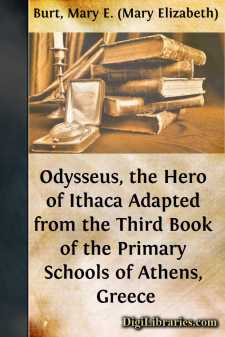Categories
- Antiques & Collectibles 13
- Architecture 36
- Art 48
- Bibles 22
- Biography & Autobiography 813
- Body, Mind & Spirit 142
- Business & Economics 28
- Children's Books 14
- Children's Fiction 11
- Computers 4
- Cooking 94
- Crafts & Hobbies 4
- Drama 346
- Education 46
- Family & Relationships 57
- Fiction 11829
- Games 19
- Gardening 17
- Health & Fitness 34
- History 1377
- House & Home 1
- Humor 147
- Juvenile Fiction 1873
- Juvenile Nonfiction 202
- Language Arts & Disciplines 88
- Law 16
- Literary Collections 686
- Literary Criticism 179
- Mathematics 13
- Medical 41
- Music 40
- Nature 179
- Non-Classifiable 1768
- Performing Arts 7
- Periodicals 1453
- Philosophy 64
- Photography 2
- Poetry 896
- Political Science 203
- Psychology 42
- Reference 154
- Religion 513
- Science 126
- Self-Help 84
- Social Science 81
- Sports & Recreation 34
- Study Aids 3
- Technology & Engineering 59
- Transportation 23
- Travel 463
- True Crime 29
Odysseus, the Hero of Ithaca Adapted from the Third Book of the Primary Schools of Athens, Greece
Categories:
Description:
Excerpt
INTRODUCTION
It has long been the opinion of many of the more progressive teachers of the United States that, next to Herakles, Odysseus is the hero closest to child-life, and that the stories from the "Odyssey" are the most suitable for reading-lessons. These conclusions have been reached through independent experiments not related to educational work in foreign countries.
While sojourning in Athens I had the pleasure of visiting the best schools, both public and private, and found the reading especially spirited. I examined the books in use and found the regular reading-books to consist of the classic tales of the country, the stories of Herakles, Theseus, Perseus, and so forth, in the reader succeeding the primer, and the stories of Odysseus, or Ulysses, as we commonly call him, following as a third book, answering to our second or third reader. This book I brought home with me and had a careful, literal translation made. I submitted this translation to that notable scholar, Zenaïde A. Ragozin, with whom I faithfully traversed the ground, word by word and sentence by sentence. This version I have carefully compared with Bryant and rewritten, making the language as simple as could be consistent with the dignity of the subject-matter.
The introduction to the original book as I found it in Greece contains many interesting points, since it shows that educators in foreign countries, notably in Germany, had come to the same conclusion with our best American teachers. The editor of the little Greek reading-book says:
"In editing this work we have made use not only of Homer's 'Odyssey,' but also of that excellent reader which is used in the public schools of Germany, Willman's 'Lesebuch aus Homer.' We have divided the little volume into three parts, the first of which gives a short resumé of the war against Troy and the destruction of that city, the second the wanderings of Odysseus till his arrival in Ithaca, the third his arrival and the killing of the wooers. We have no apology to make in presenting this book to the public as a school-book, since many people superior to us have shown the need of such books in school-work. The new public schools, as is well known, have a mission of the highest importance. They do not aim, as formerly, at absolute knowledge pounded into the heads of children in a mechanical way. Their aim is the mental and ethical development of the pupils. Reading and writing lead but half way to this goal. With all nations the readers used in the public schools are a collection of the noblest thoughts of their authors."
The Greek editor had never read the inane rat and cat stories of American school "readers" when he wrote that. He continues:
"Happily the Greek nation, more than any other, abounds in literary masterpieces. Nearly all of the Greek writings contain an abundance of practical wisdom and virtue. Their worth is so great that even the most advanced European nations do not hesitate to introduce them into their schools. The Germans do this, although their habits and customs are so different from ours....




